Xi’an Eurasia University boasts an international campus culture, which encourages students to explore places around the world. Some of the students participate in Eurasia's exchange programs in cooperation with overseas colleges and universities, some pursue advanced studies in overseas schools, and some have made a successful career overseas ... The "Overseas Eurasiaers" column on the WeChat official account of Xi’an Eurasia University tells stories about striving for dreams of Eurasia people studying or working overseas.

Today, we have invited Zhang Jing, a student majoring in accounting (ACCA) and graduated in 2019 from Eurasian School of Accounting to share her experience at the University of York in the UK. Let's follow her to experience the cross-cultural classes of professors from all over the world at the University of York and listen to the story of how she changed from resisting the UK cuisine to falling in love with it. On the way to that alien country, she was curious about the outside world and had a lot of dreams for the future. In the UK, she started a romantic journey to Western Europe. As Zhang Jing said, only when we are full of courage, can we encounter more adventures.

Zhang Jing majored in Accounting (ACCA) Major and was graduated from Eurasia School of Accounting in 2019. Zhang won the first prize of the 2017 Management Accounting Case Competition of the Eurasia School of Accounting, the second prize of the 2nd "'First Cup" Accounting Skills Application Competition of Shaanxi Province, the third prize of the Northwest Competition Zone of the 8th IMA Campus Management Accounting Case Competition, and the ZBG Special Education Award. Zhang is now studying for a master's degree in accounting and financial management at the University of York in the UK.
![]()
Study at the University of York: Having Rich and Avant-garde Learning Experiences
Q: When applying for foreign colleges and universities, why did you finally choose the Accounting and Financial Management Major at the University of York?
Zhang Jing: I applied for five schools and received four offers. I finally chose the University of York because it is highest-ranking. I chose accounting and financial management because it is most closely linked to my undergraduate major. In fact, I had another choice then, that is, the University of Leeds, where I desired to study very much. However, the major in Leeds that I could only choose was economics, so I decisively gave up. I knew my abilities and knew what was most suitable for me. If I had chosen economics, I would probably be bald now.

School badge of the University of York
Q: You majored in accounting (ACCA) at the Xi’an Eurasia University and you have passed the ACCA exams. How did these help you apply for overseas universities?
Zhang Jing: I have had a broader vision after I learned ACCA courses, and I also had the idea of studying abroad after that. Having taken ACCA courses and obtaining its certificate are helpful for applying for overseas schools because ACCA courses are just the undergraduate courses of the students majoring in accounting and finance in the UK universities and colleges. When I study at the University of York, I don't have difficulty understanding teachers in class because my study for ACCA courses has laid good foundations for me. More importantly, after learning the courses, I have known how to be free from arrogance and impetuosity and how to be more patient and I have known that I should complain less.
Click here to read: Words from Students Graduated in 2019 | Zhang Jing: University of York, Here I Am!
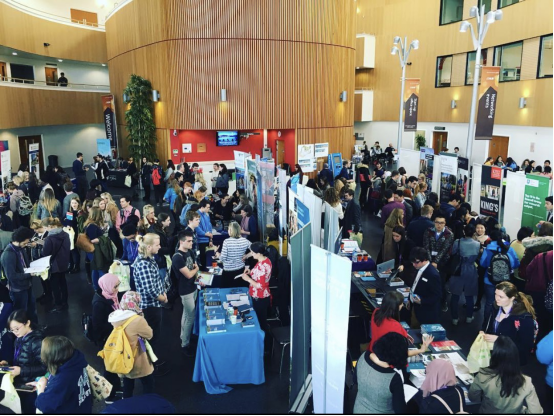
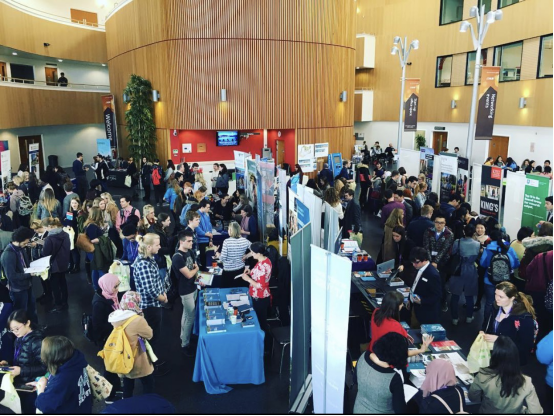
Student clubs recruit new members when a new term begins
Q: What courses do you need to take for the major of Accounting and Financial Management at the University of York?
Zhang Jing: Our main courses include Advanced Management Accounting, Advanced Financial Accounting, Financial Strategy and Management, and Dialectical Thinking of Accounting. The curriculum is basically the same as that of Xi’an Eurasia University. What has impressed me the most in the study is that western education pays much attention to dialectical thinking. At first, I couldn't adapt to it. Later, however, I gradually get used to it. Now my way of thinking is very different from that at the time when I just came to the UK. Dialectical thinking has even helped me a lot in life. For example, now I can think about problems from multiple perspectives, so I won't worry about them too much. Mr. Lu Xun wrote in A Madman's Diary, "If a thing is always done in the same way, is the way necessarily right?", which shows dialectical thinking, as well as a confident attitude, that is, believing what I am thinking about and having the courage to express it while embracing different opinions.

RCH Teaching Building on the east campus of the University of York
Q: Which courses have impressed you the most?
Zhang Jing: What has improved me the most should be the different teaching styles of teachers from different countries. Our teachers come from Germany, the UK, Russia, India, and many other countries, and every teacher has his or her own teaching style.
The German teacher speaks very slowly, and he is super gentle. I admire him very much for his rigor, carefulness, and patience. He manually annotates every piece of teaching material that he prepares to explain to us with pens of different colors. When I ask him questions privately, he listens to me very patiently. Knowing I'm not a native English speaker, he always helps me express what I want to and tries his best to understand me. He is also very thoughtful. At Christmas last year, I saw him in the street. I didn't say hello to him immediately because I thought he taught so many students that he probably didn't remember me. Unexpectedly, he waved his hand to me first and said, "Merry Christmas", which was so moving and surprising.
The teacher from the UK is very gentlemanly. I like British English pronunciation very much, so I enjoy all his classes.
The Russian teacher is very interesting. He told us that as he had taught a lot of Chinese students, he knew Chinese students were shy of expressing themselves in class probably because they were afraid of making mistakes in speaking English. He always encourages Chinese students, "Don't worry about making mistakes. I'm a non-native English speaker like you, so I am also nervous sometimes when teaching classes. But you can overcome it if you just use English as a communication tool frequently!" He also likes to discuss Chinese cultures with us and shows how he likes China. This year, the Russian teacher taught the last class on the day before the Chinese New Year. He told us that he liked eating dumplings very much and he knew the Spring Festival was of great significance to us, so he finished the class in advance to let us celebrate the New Year.
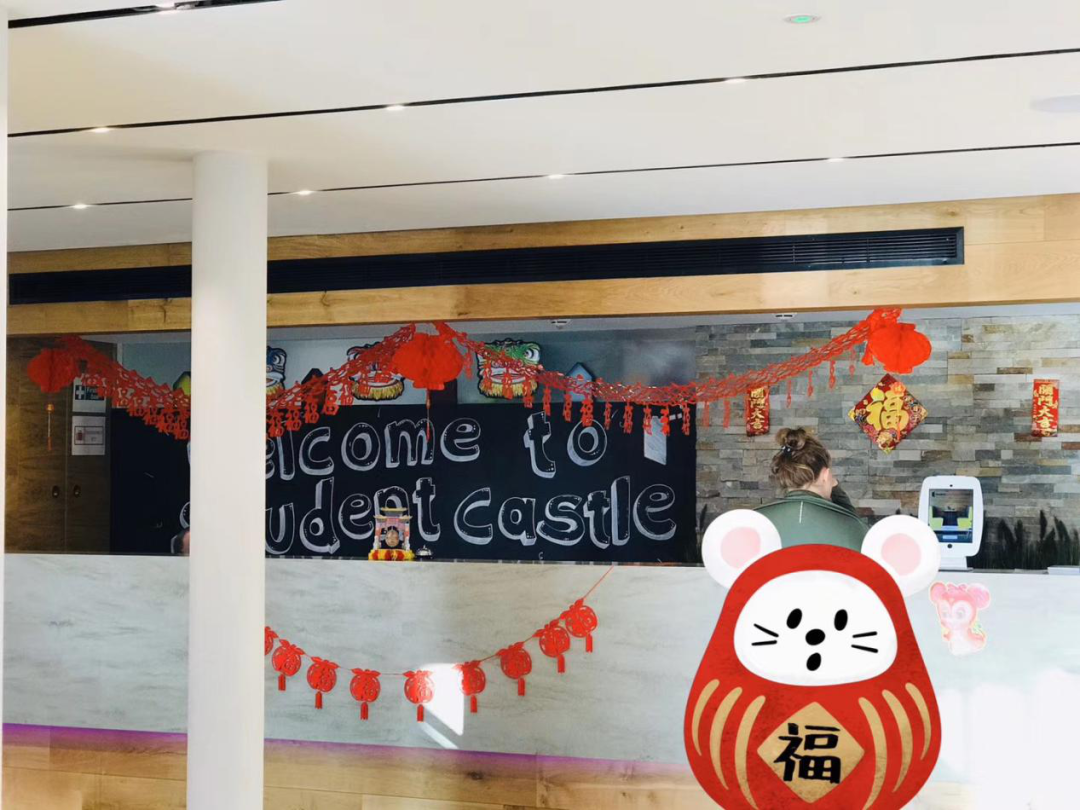
Apartment during the Spring Festival
Q: What are the classes at the University of York like? What are the characteristics of the teaching methods of the teachers?
Zhang Jing: We have classes in two ways. One is the lecture, and the other is the seminar. Generally, teachers give lectures in big classrooms for more than one hundred students, when they often teach us theoretical knowledge. Seminars are for consolidating the knowledge learned from lectures. In a seminar, there are often only 10-15 students. We mainly use the seminar time to finish the after-class assignments given in lectures and teachers use it to answer our questions one by one.
All teachers can answer our questions after class, but we must make an appointment in advance via email. Western people care a lot about the balance between work and life. If you need the help of teachers to deal with something, you must ask them about it within workdays, because they will enjoy the weekends with their families.
In fact, the way of working shows not only western people's high work efficiency but also the cultural difference between China and the West. Although they cannot always finish working tasks within working hours, they don't care a lot about that because in their views, enjoying life is more important. That is also the life I long for in the future. So when I finish my studies in the UK and return to China, I need to keep up with the pace of life in China. I hope that I can also find a balance between work and life after I start my career.
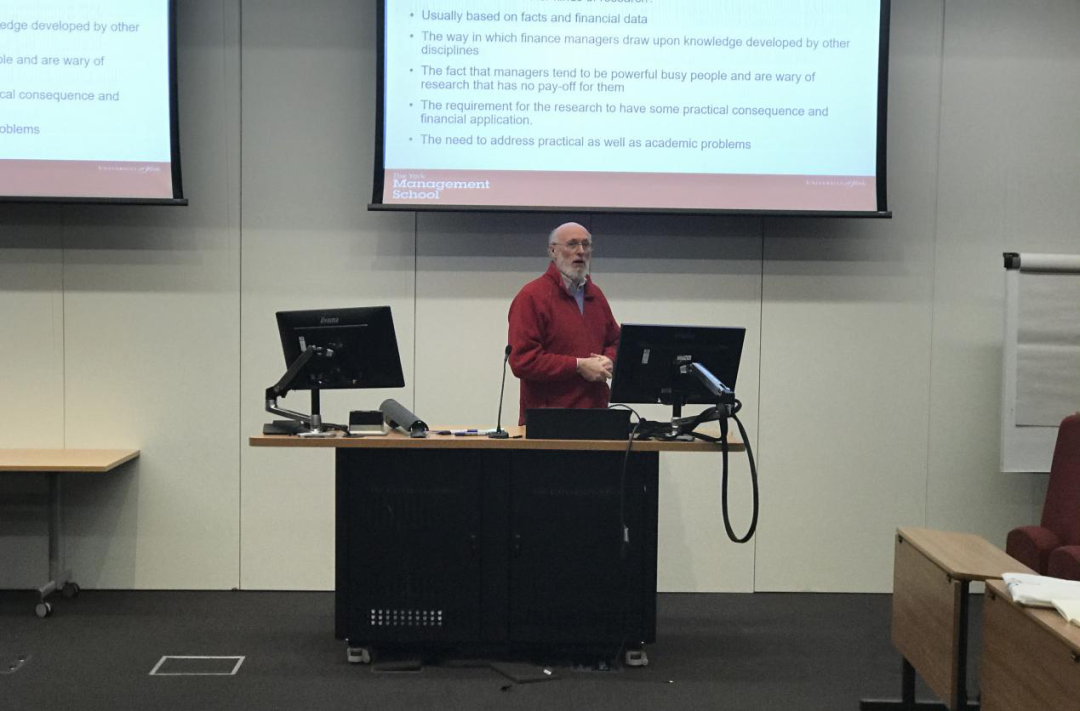
Class at the University of York
Q: Talk about your unforgettable off-campus activities at the University of York?
Zhang Jing: My friends and I participated in various off-campus activities, such as experiencing the haunted house in York Maze on Halloween, watching the Torch Festival in Edinburgh on Christmas Day, visiting the Winter Wonderland on New Year's Eve in London, and saying Happy New Year to strangers in the streets of London. I was also very impressed by the psychological counseling service provided by the school. The school is quite concerned about people's mental health. The school will send an updated email about the psychological counseling center service every week, and we can contact the counseling center at any time if we need it. In particular, during the quarantine period this year, there were many papers to write, so the school granted us a privilege, that is, we could apply to delay the deadline for papers without providing proof. The reason that high psychological pressure affected learning efficiency was enough for us to apply for the delay.

Halloween | New Year in London | Christmas Bazaar
Q: What interesting things have you experienced and what difficulties have you met in your study and life at the University of York?
Zhang Jing: I would say the difficulties I met are also a lot of fun. Even if they were very difficult to deal with at that point, we like to roast our lives sometimes, so they're actually full of fun when we look back on them. For example, the winter time, when the night is so long, is extremely impressive for me. There is an eight-hour jet lag between the UK and China in winter. On that evening when the summertime with seven-hour jet lag changed to the wintertime, the time jumped from two a.m. to one a.m., which is like back in time. I had 25 hours on that day. In winter, it gets dark at three or four p.m., and it doesn't dawn until about nine a.m. the next day. As the weather gets colder and the daytime gets shorter, all shops are closed, except for supermarkets, so the atmosphere in the city may become somewhat depressing.
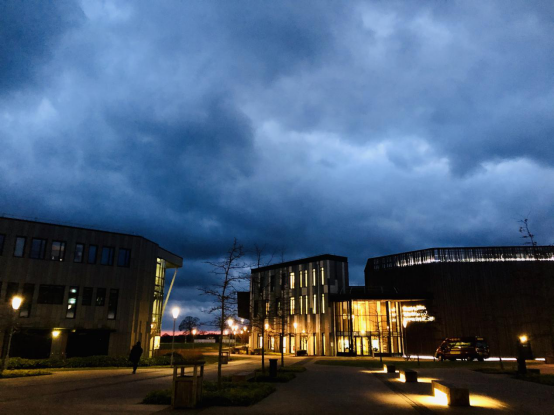
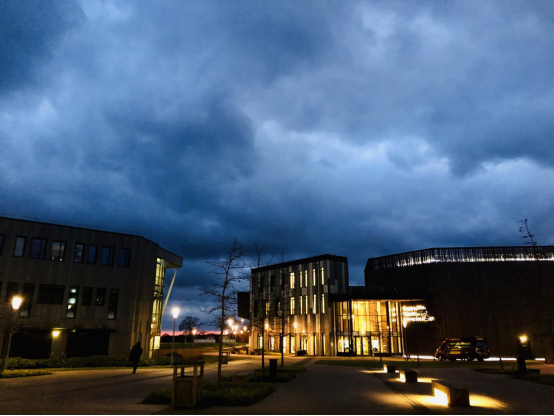
School at 3:30 p.m. in winter time
![]()
Life in Western Europe: A Romantic Picture on the Corridor of Time
Q: What's your first impression of the UK? Has your impression of it changed after you lived there for a period?
Zhang Jing: My impression of the UK when I just came there was that there was little delicious food. During the first week, what I ate most were instant noodles and fried fish and chips. After living for a period, however, my attitude toward the food there changed. Despite the undistinguished British food, I found a lot of delicious Thai and Vietnamese food in the UK. Another thing I found is that people do things inefficiently in the UK. Once, I took a bank letter from the school to apply for a bank card. The bank worker asked me to go back to school to take a new letter just because the room number in the address column was written after the name of the apartment. I asked whether it worked if I marked it and changed the order. The worker said no and still demanded a new bank letter. I was wondering why the worker couldn't be more flexible. It would take me at least two hours to go back to school and line up to get a new bank letter, let alone the reappointment with the bank. I think this is a disguised way to put burdens on both sides.
But I have also met a lot of lovely people: an old man I met in a supermarket introduced with a smile to me his first pick of baking bread after seeing through my hesitation in picking; the guy selling hamburgers at the Christmas Bazaar treated me for free as I had no cash with me, then I looked for him for a week and tried to pay him, but I couldn't find him; a kind old woman said to me when I pushed a shopping cart with a Lotso in it in a supermarket that this Lotso (bear doll) would warm me throughout the winter.


The rainbow after the rain at York Minster
Q: How about your daily life in the UK?
Zhang Jing: The schedule for the one-year postgraduate program in the UK was very tight. As we had to finish within one year in the UK the studies that we need 1-2 years to finish in other countries, we felt great pressure. The biggest difference between studying in the UK and in China is: The student assessment mode of the UK is mainly based on papers, which require students to consult a large number of materials, and the "Deadline" is the only driving force.
Q: Have you experienced any cultural differences in life? And how have you adapted to them?
Zhang Jing: Eating habits in the two countries are totally different, and so is the mealtime. Usually, the UK people have a rich brunch around 10 a.m., which is relatively late compared with the breakfast time in China. If they don't have work to do in the afternoon, they will have nice afternoon tea, which is followed by a rich dinner. So most of our classes are at noon, and I have to adjust my mealtime.
Speaking of afternoon tea, the leisurely and slow life in the UK is really comfortable. You may see the elderly sitting in coffee shops with a pot of tea or coffee, holding hands with each other, and chatting with each other. You may also see some people spend a whole afternoon with books and a cup of coffee and passengers reading books on the London Tube.
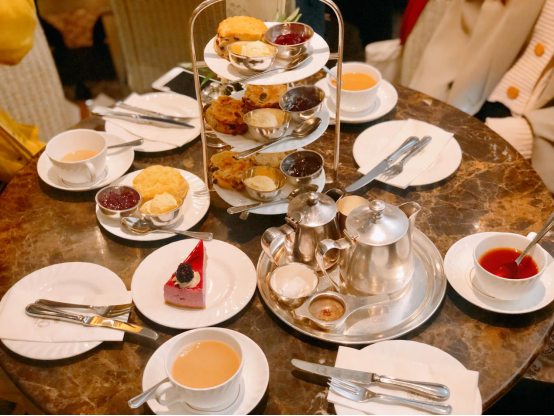
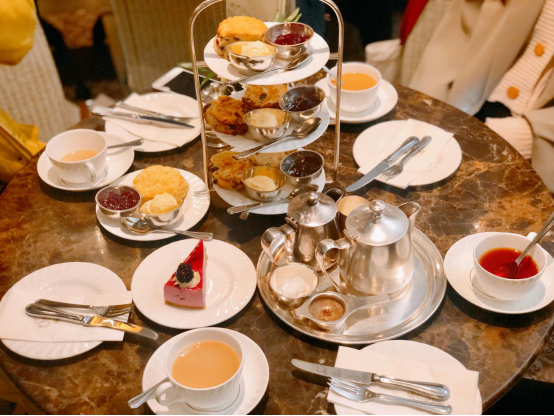
Afternoon tea at York
Q: How do you spend your spare time after school?
Zhang Jing: I often drink some red wine to relax myself, and drinking a little red wine in the evening can help me sleep. I also like to discover delicious food. Sometimes I cook at home with friends from different cities, and I feel really warm at that time. Unexpectedly, the greatest pleasure in the UK for me is shopping in supermarkets. When I first arrived, I didn't know what was palatable in supermarkets, so I followed the local people and chose what they chose. During the pandemic, I went shopping every two weeks, so I bought different kinds of food.


Youpo noodle made with friends
Q: Which cities or countries have you been to during the period of studying abroad? Can you share some of your unforgettable experiences and moments?
Zhang Jing: During the Christmas holiday, I went to the Scottish Highlands, Loch Ness, and the Isle of Skye, and I saw the snow-covered Glenfinnan Viaduct leading to Hogwarts. At that time, I was under the delusion that I could go to the Hogwarts School of Witchcraft and Wizardry if there was a train running through to take. By the way, there was no Nessie but lovely deer in Loch Ness. The Scots were very hospitable. Also, I was impressed by the unpredictable weather there. It rained and hailed for three out of the four days when I stayed in Scotland. To my satisfaction, on the last day, when I was in St Andrews, it cleared up. There's nothing more enjoyable than going to the seaside on a sunny day.

George square in Glasgow | London | St Andrews
![]()
Look into the Future: To See the Farther World
Q: In your view, what should a student pay attention to during undergraduate studies if he or she wants to get the offer of their dream overseas master's programs?
Zhang Jing: It's based on the specific requirements of the schools they choose. The schools in some countries may give priority to language proficiency (such as IELTS score), while in some other countries, the schools value the average score of undergraduate courses most, and internship experience and prizes of competitions are also useful. Probably, some students don't plan to go abroad until they are juniors or even seniors. At that time, it's a little late to improve the average score or take an internship, So it's better to study hard and improve themselves in competitions from the freshman year.
We all hope to have a relaxing period after the college entrance examination and we all feel very curious at the beginning of the university. After that, we should gradually learn to balance entertainment and learning. Work hard, play harder. In fact, studying hard also provides an extra option for the future. After all, an excellent GPA carries conviction anywhere. Whether you're going to study abroad, take part in the postgraduate entrance exam, or apply for a job, it is the most simple and direct way to prove your learning ability.
Q: What abilities do you think are important for applying for schools and studying abroad?
Zhang Jing: It's important to learn how to collect information by yourself and to fight for rights and interests for yourself. Don't act like a hands-off boss even if you have entrusted an intermediary agent for the application. Then keep your curiosity. Don't be a chicken, and to experience as many different things as you can during the period of studying abroad.
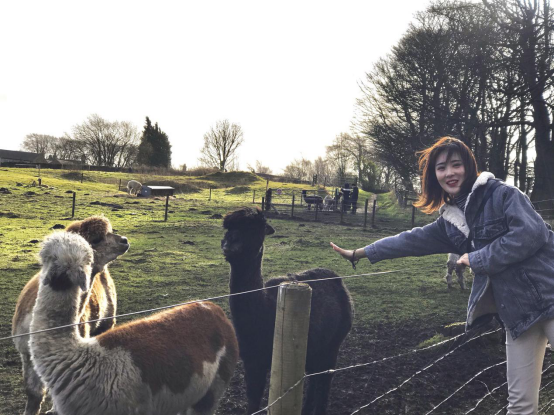
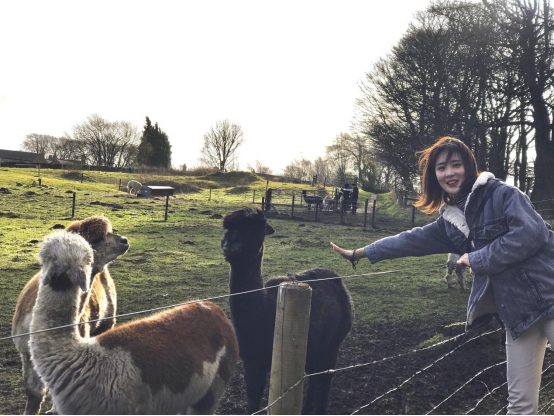
See alpacas in Sheffield
Q: What's your biggest change when you study abroad?
Zhang Jing: My biggest change is in the mindset. This period has taught me to look ahead rather than regret what has happened. The outbreak brought many things to a halt, and I have really understood the saying that "Plans always fall behind changes". The UK's response to the pandemic was a month later than that of China. The quarantine measures were triggered in March and ended in June. I haven't returned to China. On the one hand, I think it's risky to return to China at the peak of the pandemic, and on the other hand, it's reassuring for me to get the school stuff done before returning to China.
I had a regular routine during the quarantine period, and to my surprise, I was gone on sports, literally putting into practice what the elders always remind me of, that is, "Health is the most important". We should probably work hard at the age of twenties, but we should also stay healthy. After all, nothing lasts forever. You can stop and have a rest when you feel tired. Sometimes you have to slow down for more stable and rapid progress. Besides, my cooking skill got improved during this period. I'm not a green hand in the kitchen anymore and I'm not afraid to cook now.
Q: What are your plans for the future?
Zhang Jing: The short-term plan is to obtain the dream offer in the recruitment in Autumn, learn a language if time permits, and come back to the UK early next year to attend the graduation ceremony. After all, the graduation ceremony marks the end of my school life. I can't make the long-term plan now. I will take each day seriously and make adjustments if necessary.
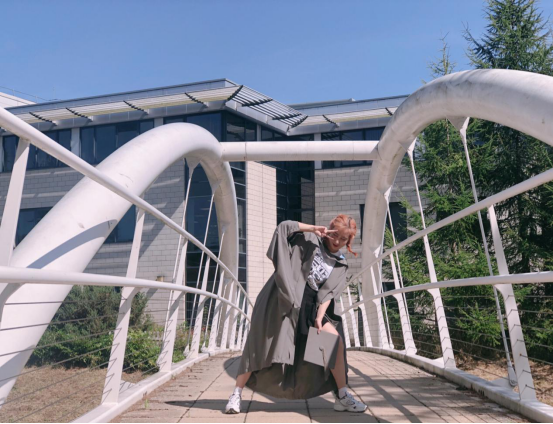
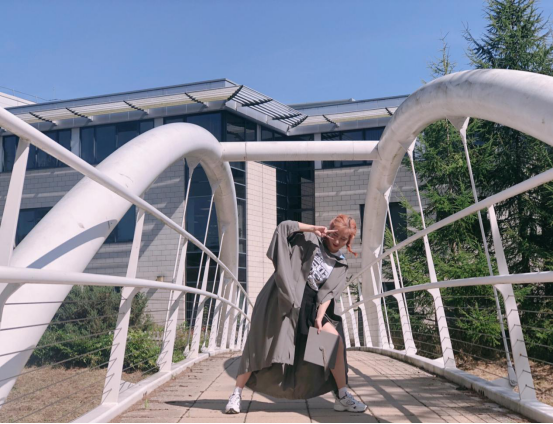
Q: Have you ever missed Xi’an Eurasia University while studying in the UK?
Zhang Jing: Actually, I have made an appointment with my friends to go back to Xi’an Eurasia University as soon as I return to Xi'an. We will together enjoy delicious food in Eurasia. I see on Eurasia's Sina microblog and WeChat official accounts that a lot of new buildings have been built and great changes have taken place there. I wonder if it is really my school. So I must go back and have a look.
Q: The freshmen enrolled in 2020 are about to register for their new term. What do you want to say to those who want to study abroad?
Zhang Jing: Cherish the moment, don't waste time, and don't count on "next time". Learning is the major task in the life of studying abroad, but it's not the only thing we need to do. To see the world, to broaden minds, and to explore ourselves are also of significance. On holidays like Christmas and Easter, they can travel to other countries for appreciating different cultures. On weekends, they can visit other cities in the country where they will stay for one or two years. There are so many roles in life. We may be a "billionaire, king or queen, or a wandering artist, or wild wind". Keep in mind, choose your favorite.
Overseas Eurasiaers
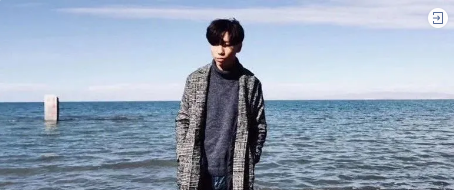
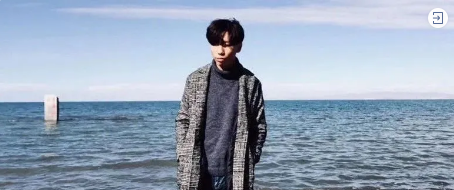
How does he chase his sports dream during the one-year exchange in Spain?


Traveling to England makes his overseas study fantastic






